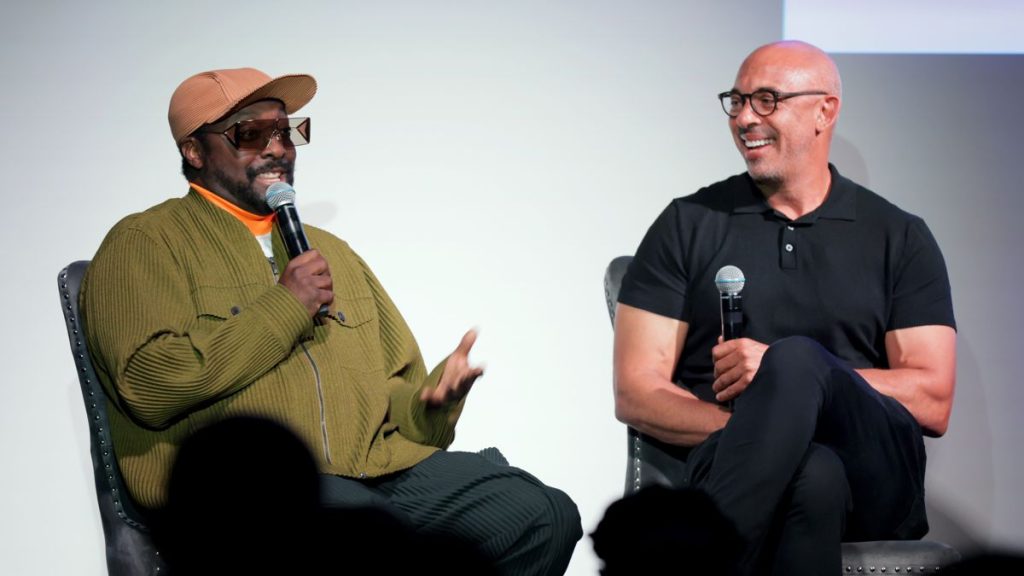Business


Photo Credit: Courtesy of the Recording Academy™/photo by Rebecca Sapp, Getty Images© 2024
Business Recently the Grammy Museum held an intimate conversation in the Clive Davis Theatre featuring the Recording Academy CEO Harvey Mason Jr. and will.i.am discussing the past, present, and future of the business now that the AI genie has been freed..
The duo spoke on how cultural and technological shifts have impacted Black music, while continuing to influence the direction it takes even today. Musician and tech entrepreneur will.i.am spoke about how algorithms drive the modern music industry and posed an interesting question for artists: “Would you rather have access to 100% of your audience and share ownership of your music that you can monetize; or would you rather own 100% of your music with no access to the audience?”
The noted musician and tech entrepreneur says he would rather have access to 100% of his audience and share the music. “I don’t think we’re in an artist and development industry right now. That’s the reason why the ones that I pointed out are artists that have had the benefits of developing. Kendrick Lamar developed. Billie Eilish developed. And then you have like this other herd that are trying to get heard on TikTok, you heard?”
“I don’t know if that is truly creative when you’re chasing an algorithm. When it’s 15 seconds of attention, how creative can you actually be when you’re chasing an algorithm and someone’s dictating what kind of song you should make or behavior you should do to get attention and traction on a platform whose algorithm is owned by China.”
“The algorithm is manipulating us and dumbing down the activity it rewards to perpetuate behaviors that aren’t really conducive to us growing as a culture,” will.i.am concludes.
As the conversation deepened into what AI music means for the industry, Harvey Mason Jr. brings up another important question for the new era—who owns an artist’s essence and likeness? That’s a problem that needs solving, with Tennessee’s ELVIS Act taking the first steps in the nation to define the right to protect one’s voice and personality rights from unauthorized exploitation.
“For me, it seems that it comes down to three things,” Mason Jr. told the audience. “Artists have to consent to allowing anyone to use their essence or likeness or voice. They’ve gotta be paid if it happens. And they have to make sure they have the approval rights and the crediting that designates [this new AI creation] as different from their human creation. Because there could be a dilution that happens if there’s AI versions out there that the artist has approved but does not credit properly.”
While speaking on the future of AI in the world, will.i.am says the power of data makes everyone compromised—because AI can be trained on anyone’s data. “Where do you bank your data at? Until we address where do you bank your data, everybody’s stuff is compromised. Every artist is, every person selling, every attorney, every banker, everybody is compromised when it comes to data.”
“That’s because they’re not telling you the truth on the power of data,” will.i.am told the audience. Mason Jr. pipes up to add to the discussion here, “No question. We can all agree there’s going to be massive disruption across every industry. But let’s talk about how it’s going to affect and impact music.”
“This is the heartbeat of humanity. This is the shared experience of how we communicate, how we tell stories. This is what makes us human. Not to disparage selling—that’s not what makes us human. Art, creativity, culture, human interaction. That’s society.”
The conversation then turns to what music means to humanity and has for thousands of years before the last 200+ years of the recorded music industry. During this conversation, will.i.am says AI should mimic live music, rather than trying to re-create recorded music.
“So before the record industry, what was a song? And what song was everybody singing?” will.i.am asks the audience. “The summer of 1624, they were like, ‘have you heard that new song by Paul Paul?’ ‘I feel that shit is fire.’ In 1724, what was the song of the summer? What about 1824? Until the recording industry you didn’t know unless you were there—because now we can all sing a similar song together because it was recorded.”
“We can put it on repeat whenever you have a device to play that recording back. There’s been music for thousands of years—the concept of music and song. So now think about how you have this infinite tool to generate music. Should it mimic a recording’s limitation? Or should it mimic how live music is live and can adapt?”
“So with AI, if you have this truly expressive tool, it shouldn’t be used to mimic recordings. Use your imagination of what it could be.”
Harvey Mason Jr. chimes in again to bring the conversation back to earth. “That’s what you’ll do,” he tells will.i.am. “That’s what I’ll do and that’s what some of our peers will do, but that’s not what everybody else is doing. Everybody else is taking AI to churn music.”
“There’s a hundred songs being created every 10 seconds,” Mason Jr. continues. “Two million new songs a day. Two million songs a day by AI that are not thinking about going left, or going right, or innovating or iterating, and making something really, really cool. They’re just churning music. And right now it’s being trained on copyrighted material, so that’s something I’d love your take on,” he invites will.i.am to answer.
“Well, one of the first questions you asked me is, how did I start making music?” will.i.am answers. “I started sampling. I sampled copyrighted material. There are now laws so that the people sampled get paid. People think Kanye’s a genius for how he samples and puts a track together, right? So now we have AI, which is the highest concept of sampling.”
“What needs to happen ultra fast is that these AI companies that make these platforms need to allow for artists to own their data set,” he concludes. “That’s the first thing that needs to happen. Because it’s just ‘yo, you need to pay us for the data you trained the model on’.”
“If you can have an AI that you can make sound like Otis Redding, it’s the Otis Redding Estate that needs to own that data. If you can make an AI that sounds like Michael Jackson, then Michael Jackson’s estate needs to own that. Not the record company. The people. Same thing with an alive artist like Kendrick Lamar. He needs to own his AI data and from there, they need to figure out how the system pays him because [AI training data] captures everyone’s essence.”
The conversation turns to how artists are influenced by other artists, with will.i.am saying his influences are Earth, Wind, and Fire, and A Tribe Called Quest. “Did you listen to my early songs? You’d be like ‘yo, that sounds like Q-Tip’. Uh, duh. That’s who I trained on. That guy influenced me. Every time I see Q-Tip, thank you so much Q-Tip. Thank you so much Busta Rhymes. And so now we have this new thing that is modeled and trained off of our brain. It’s a new brain that’s in our midst, literally a new network.”
“What should happen first? To protect the artist, the artist needs to own their dataset. To protect business folks, they need to own their data. Everything has some link to some other original vibe, sound, or story and it’s all been influenced by each other. But this is the first time that we’ve had an alternative awesome brain in our midst. So I think artists need to be protected first by owning their data set.”
“Your data set and your AI system should be yours. We cannot let sharing—this thing they do with where you don’t necessarily have records. You have access to it. You don’t have a car. You have access to it. You don’t own land or a house. You have access to it. You don’t have AI data ownership, but you have access to it.”
From there, the conversation turns to how will.i.am is using AI within FYI, showcasing the new tool RAiDiO—which he claims will revolutionize radio the same way the iPhone changed the telephone. The key focus is to create an interactive radio experience that integrates real-time, relevant information with personalized interaction, while retaining the ability to inform on any topic of the user’s choice. RAiDiO is releasing this summer.
The new platform allows listeners to ask questions and receive detailed responses about a variety of topics, ranging from current events, to personal interests—all directly from the radio broadcast. The use of AI here is to enhance the listener experience and make it possible to interact with the DJ to receive more in-depth information with a personal touch.
DMN spoke with will.i.am about this project during our exploration of the rules for AI and how it will shape the future of the music industry. He also spoke with DMN on the future of radio and how FYI will help shape the way AI takes hold in the radio industry—transforming it for a new era.
His example creates a radio DJ that feels personable and can answer questions about what’s being played, who wrote it, their influences, and even pull quotes from the artist in real-time from publications like Rolling Stone magazine. All of this is done at the request of the user, who can interact with the DJ as though sitting in the room with them.
This is just one of the ways in which will.i.am believes the use of AI will revolutionize the music industry, making it more interactive and personal while retaining its informative properties that sets radio apart from algorithmic generated playlists.
“This is another interesting plug-in!”
“Recently the Grammy Museum held an intimate conversation in the Clive Davis Theatre featuring the Recording Academy CEO Harvey Mason Jr. and will.i.am discussing the past, present, and future of…”
Source Link: https://www.digitalmusicnews.com/2024/07/02/recording-academy-ceo-will-i-am-grammy-museum-chat/
#Business – BLOGGER – Business